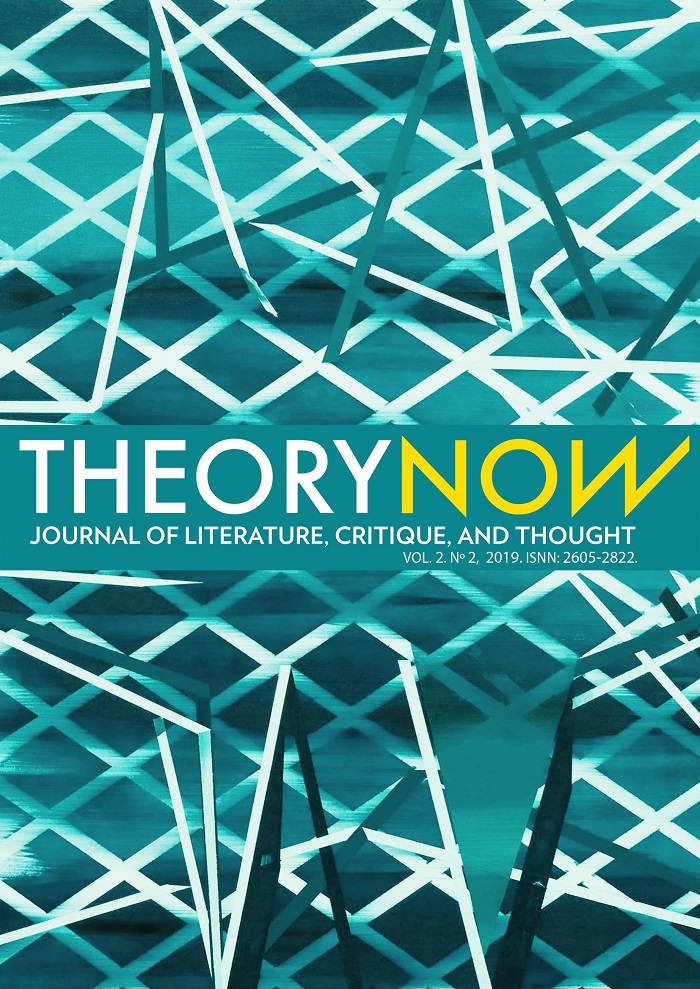World Literature, War, Revolution: the Significance of Viktor Shklovskii’s A Sentimental Journey
DOI:
https://doi.org/10.30827/tnj.v2i2.9829Keywords:
Viktor Shklovskii, World Literature, Russian Literature, Literariness, Russian formalismAbstract
This article examines Shklovskii’s previously overlooked engagement with a discursive domain we currently tend to refer to as ‘world literature’; as such, it is an original contribution not just to understanding A Sentimental Journey, arguably the richest part of Shklovskii’s 1920s memoir trilogy, but also to honing a transnational approach to his writing. While Shklovskii’s work has already been discussed through the prism of mobility and nomadism, this article emphasises his active involvement in, and reaction to, early Soviet discourses and practices of ‘world literature’. It places Shklovskii’s commitment to the idea of world literature in the broader context of our present debates on the subject. To understand ‘world literature’ as a specific construct, we must ask the unavoidable question about the location of ‘world literature’ vis-à-vis language, which has important consequences for how we interpret the dispersed legacy of modern literary theory (founded, undoubtedly, by Shklovskii and the Russian Formalists); this would allow us to recognize the enduring relevance of Shklovskii’s understanding of literariness for current debates on world literature.Downloads
References
Apter, Emily. Against World Literature: On the Politics of Untranslatability. Londres, Verso, 2013.
Arnold, Matthew. Culture and Anarchy. Cambridge, Cambridge University Press, 1875-1932.
Bajtín, Mijaíl M. La cultura popular en la Edad Media y el Renacimiento, traducido por Julio Forcat y César Conroy. Barcelona, Barral, 1971.
___. Estética de la creación verbal, traducido por Tatiana Bubnova. México, Siglo Veintiuno, 1982.
Clark, Katerina. Moscow, the Fourth Rome: Stalinism, Cosmopolitanism, and the Evolution of Soviet Culture, 1931–1941. Cambridge, MA, Harvard University Press, 2011.
Damrosch, David. What is World Literature? Princeton, Princeton University Press, 2003.
David, Jérôme. Spectres de Goethe : Les métamorphoses de la “littérature mondiale”.París, Les Prairies Ordinaires, 2011.
Dwyer, Anne. “Revivifying Russia: Literature, Theory, and Empire in Viktor Shklovsky’s Civil War Writing”. Slavonica, vol. 15, nº 1, 2009, pp. 11–31.
___. 2016. “Standstill as Extinction: Viktor Shklovsky’s Poetics and Politics of Movement in the 1920s and 1930s”. PMLA, vol. 131, nº 2, 2016, pp. 269–288.
Éijenbaum, Borís. “O Genri i teoriia novelly”. Literatura: Teoriia. Kritika. Polemika. Leningrado, Priboi, 1927, pp. 166-209.
Epelboin, Annie. 2005. “Littérature mondiale et Révolution”. Où est la littérature mondiale ?, Cristophe Pradeau y Tiphaine Samoyault (eds.), Saint-Denis, Presses Universitaires de Vincennes, 2005, pp. 39-49.
Finer, Emily. Turning into Sterne: Viktor Shklovsky and Literary Reception. Leeds, Legenda, 2010.
Hamilton, Grant. “Defamiliarization and the Act of Reading World Literature”. Deleuze and the Humanities: East and West, Roisi Braidotti et al. (eds.), Londres, Rowman & Littlefield, 2018, pp. 11-26.
Hansen-Löve, Aage. “Russkie kak kochevniki: Kontsepty nomadizma v russkoi kul’ture”. Verba volant, scripta manent: Festschrift k 50-letiiu Igoria Pil’shchikova, Nikolai Poseliagin y Mikhail Trunin (eds), número especial de Zbornik matitse srpske za slavistiku, vol. 92, 2017, pp. 317–30.
Hopensztand, Dawid. “Filozofia literatury formalistów wobec poetyki futuryzmu”. Zycie literackie, vol. 5, 1938, pp. 182–92.
___. “Formalist Literary Philosophy versus Poetics of Futurism”, traducido por Bogdan Lawen-dowski. Literary Studies in Poland/Études Littéraires en Pologne, vol. 21,1989, pp. 107–19.
Katalog izdatel’stva “Vsemirnaia literatura” pri narodnom komissariate po prosveshcheniiu.Vstupitel’naia stat’ia M.Gor’kogo/Catalogue des éditions de la «Littérature mondiale» paraissant sous le patronage du Commissariat de L’Instruction Publi- que. Préface de M. Gorky. Petrogrado, Vsemirnaia literatura, 1919a.
Katalog izdatel’stva “Vsemirnaia literatura” pri narodnom komissariate po prosveshcheniiu. Literatura Vostoka/Catalogue des éditions de la «Littérature mondiale» La littérature de l’Orient. Petrogrado, Vsemirnaia literatura, 1919b.
Khotimsky, Maria. “World Literature, Soviet Style: A Forgotten Episode in the History of an Idea”. Ab Imperio, vol. 3, 2013, pp. 119–54.
Mufti, Aamir. Forget English: Orientalisms and World Literatures. Cambridge, MA, Harvard University Press, 2016.
Shklovski,Víktor. Marko Polo. Moscú, Zhurnal’no-gazetnoe ob’’edinenie, 1936.
___. Viaje sentimental. Crónicas de la revolución rusa, traducido por Carmen Artal. Barcelona, Anagrama, 1972.
___. “Sentimental’noe puteshestvie”. “Eshche nichego ne konchilos’…”, Víktor Shklovski,A. Galushkin (ed.). Moscú, Propaganda, 2002, pp. 15–266.
___. Sobranie sochinenii, vol. 1: Revoliutsiia, editado por Ilya Kalinin. Moscú, Novoe literaturnoe obozrenie, 2018.
Tihanov, Galin. “The Politics of Estrangement: The Case of the Early Shklovsky”. Poetics Today, vol. 26, nº 4, 2005, pp. 665–96.
___. “Cosmopolitanism in the Discursive Landscape of Modernity: Two Enlightenment Articulations”. Enlightenment Cosmopolitanism, D. Adams y G. Tihanov (eds.), Londres,Legenda, 2011, pp. 133–152.
___. “Russian Formalism”. The Princeton Encyclopedia of Poetry and Poetics, 4ª ed., Ronald Greene et al (eds.), Princeton, Princeton University Press, 2012a, pp. 1239–42.
___. “Framing Semantic Paleontology: The 1930s and Beyond”. Russian Literature, vol. 72, nº 3-4, 2012b, pp. 361–84.
___. “Pamiat’ teorii: o nasledii russkogo formalizma”. Russkaia intellektual’naia revoliutsiia, 1910–1930-kh godov, S. Zenkin y E. Shumilova (eds.), Moscú, Novoe literaturnoe obozrenie, 2016, pp. 58–63.
___. “On the Significance of Historical Poetics: In Lieu of a Foreword”. Poetics Today, vol.38, nº 3, 2017a, pp. 417–28.
___. “The Location of World Literature”. Canadian Review of Comparative Literature, vol.44, nº 3, 2017b, pp. 468–81.
Tyulenev, Sergey. “Vsemirnaia Literatura: Intersections between Translating and Original Literary Writing”. Slavic and East European Journal, vol. 60, nº 1, 2016, pp. 8–21.
Yedlin, Tovah. Maxim Gorky: A Political Biography. Londres, Praeger, 1999.
Downloads
Published
How to Cite
Issue
Section
License
Theory Now. Journal of Literature, Critique, and Thought is an immediate open-access publication which is available at no cost for readers and authors alike. Authors are not charged any kind of fee for the editorial processing of their articles. Reading, downloading, copying, distributing, printing, searching, linking or reusing all published articles for non-commercial uses is allowed on the condition of citing the author, the journal and the editing body. All intellectual material published in this journal is protected under a Creative Commons Attribution-NonCommercial 3.0 Spain license.
Dissemination of the articles in social (Facebook, Twitter, Linkedin, etc.) and scientific networks (ResearchGate, Academia.edu, etc.), public repositories at universities and other institutions, blogs, personal or institutional websites, Google Scholar, ORCID, ResearchID, ScopusID, etc. is strongly encouraged. In all cases, the intellectual property of the articles and any possible monetary profits derived from them belong exclusively to the authors.













